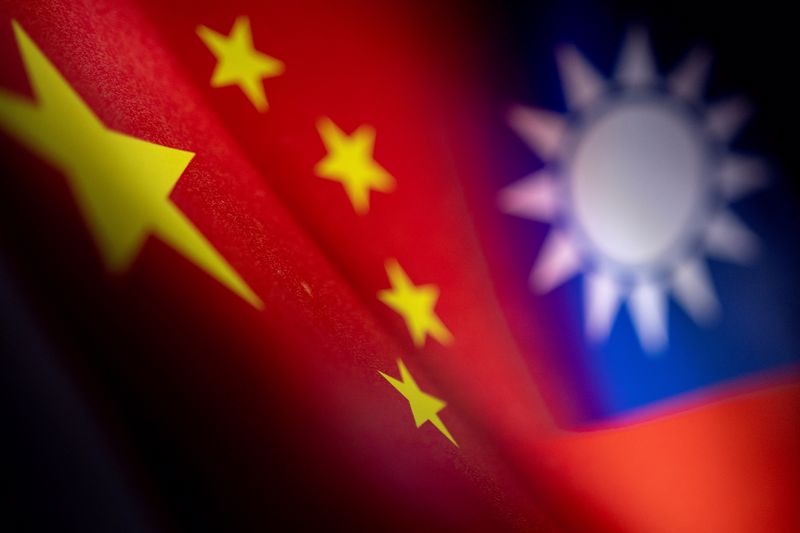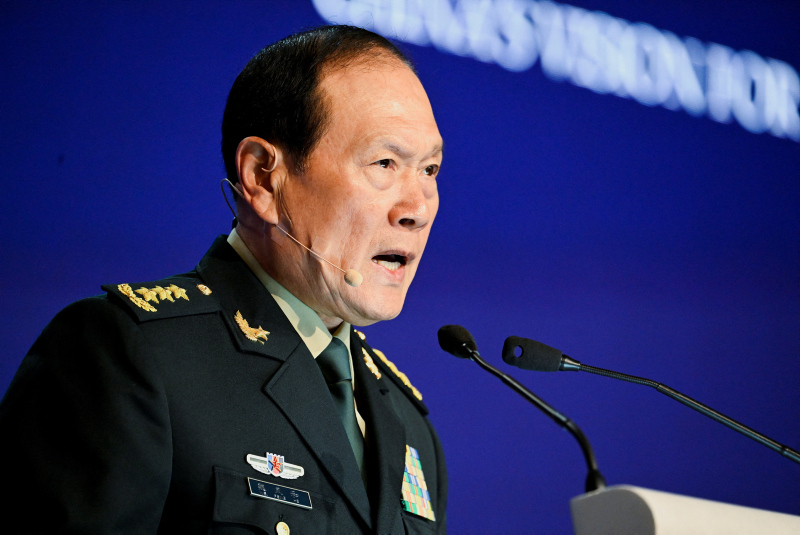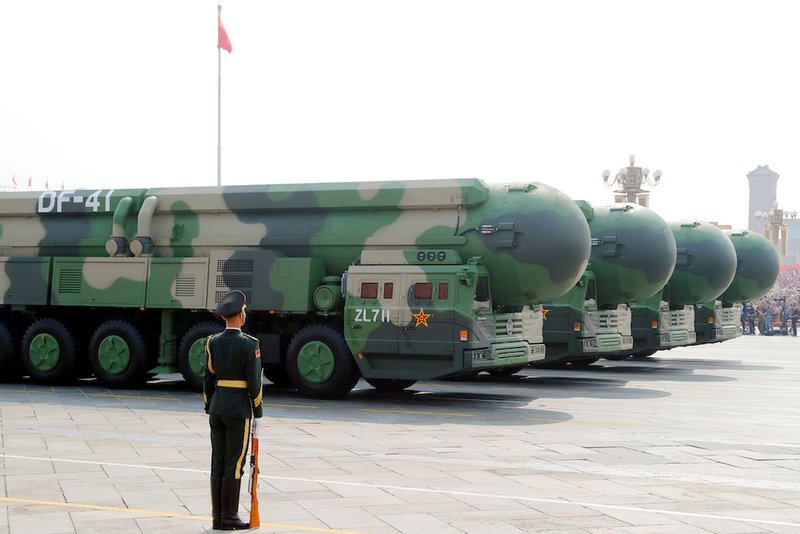China will "fight to the very end" to stop Taiwanese independence, the country's defence minister vowed Sunday, stoking already soaring tensions with the United States over the island.
The superpowers are locked in a growing war of words over the self-ruled, democratic island, which Beijing views as part of its territory awaiting reunification.
Frequent Chinese aerial incursions near Taiwan have raised the diplomatic temperature, and on Saturday, US Defense Secretary Lloyd Austin accused Beijing of "destabilising" military activity in a speech to the Shangri-La Dialogue security summit.
Defence Minister Wei Fenghe hit back in a fiery address at the same event, saying Beijing had "no choice" but to fight if attempts are made to separate Taiwan from China.
"We will fight at all cost, and we will fight to the very end," he said.
"No one should ever underestimate the resolve and ability of the Chinese armed forces to safeguard its territorial integrity."
"Those who pursue Taiwanese independence in an attempt to split China will definitely come to no good end," he added.
Wei urged Washington to "stop smearing and containing China... stop interfering in China's internal affairs and stop harming China's interests".
But he also struck a more conciliatory tone at points, calling for a "stable" China-US relationship, which he said was "vital for global peace".
During his address, Austin stressed the importance of "fully open lines of communication with China's defence leaders" in avoiding miscalculations.
The pair held their first face-to-face talks on the sidelines of the summit in Singapore on Friday, during which they clashed over Taiwan.

Taiwan does not want to close the door to China and is willing to engage in the spirit of goodwill, but on an equal basis and without political preconditions, Premier Su Tseng-chang said on Sunday.
Relations between Taipei and Beijing, which claims democratically ruled Taiwan as its own territory, are at their lowest in decades, with China increasing political and military pressure to get the island to accept its sovereignty.
Earlier on Sunday at a security forum in Singapore, China's defence minister said the Chinese government sought "peaceful reunification" with Taiwan but reserved "other options".
Speaking to reporters after China banned the import of grouper fish from Taiwan on safety grounds, a move Taipei called politically motivated, Su said Taiwan has always had goodwill towards China.
"As long as there is equality, reciprocity and no political preconditions, we are willing to engage in goodwill with China," he said, reiterating a position President Tsai Ing-wen has repeatedly made in public.
"As for China's harassment of Taiwan with military aircraft, warships, unreasonable suppression and political actions, the one being most unreasonable is China," he added.
"Taiwan does not want to close the door to China. It is China that has used various means to oppress and treat Taiwan unreasonably."
China has refused to speak to Tsai since she was first elected in 2016, viewing her as a separatist who has refused to accept that China and Taiwan are part of "one China".
Tsai says only Taiwan's people can decide their future, and while they want peace with China will defend themselves if attacked.
Taiwan's people, who live in one of Asia's most freewheeling and liberal democracies, have shown no interest in being ruled by autocratic China.
China has never renounced the use of force to bring Taiwan under its control.

Tensions over Taiwan have escalated in particular due to increasing Chinese military aircraft incursions into the island's air defence identification zone (ADIZ).
President Joe Biden, during a visit to Japan last month, appeared to break decades of US policy when, in response to a question, he said Washington would defend Taiwan militarily if it was attacked by China.
The White House has since insisted its policy of "strategic ambiguity" over whether or not it would intervene had not changed.
The dispute is just the latest between Washington and Beijing, who have clashed over everything from the South China Sea to human rights in Hong Kong and Xinjiang.
China's expansive claims to the sea, through which trillions of dollars in shipping trade passes annually, have stoked tensions with rival claimants, Brunei, Malaysia, the Philippines, Taiwan and Vietnam.
China, whose historical claims were rejected in a landmark 2016 Hague ruling, has been accused of flying its planes and sailing its boats close to the coastlines of rival claimants, and of intercepting patrol planes in international airspace in a dangerous fashion.
Defence Minister Wei Fenghe insisted Sunday that China respects freedom of navigation in the seas, and took a veiled swipe at Washington.
"Some big power has long practised navigation hegemony on the pretext of freedom of navigation," he said. "It has flexed its muscles by sending warships and warplanes on a rampage in the South China Sea."
Wei said China -- North Korea's main ally -- wanted peace on the Korean Peninsula following Pyongyang's blitz of sanctions-busting rocket launches and as fears grow it is preparing for a nuclear test.
"The key to (resolving) the problem now is to pay attention to and meet the security interests of all parties," he said.
Speaking at the Shangri-La Dialogue on Sunday, South Korean Defence Minister Lee Jong-sup said Seoul would boost its defence capabilities and work with the United States in face of the threat from the North.
"The level of tensions on the Korean Peninsula remains higher than in any other place in the world," he said.
The United States and China have also been at loggerheads over Russia's invasion of Ukraine, with Washington accusing Beijing of providing tacit support for Moscow.

China has made "impressive progress" in developing new nuclear weapons, but will only use them for self-defence, and never use them first, Chinese Defence Minister told delegates at the Shangri-La Dialogue on Sunday.
In response to a question about reports last year on construction of more than 100 new nuclear missile silos in China's east, he said China "has always pursued an appropriate path to developing nuclear capabilities for protection of our country".
He added nuclear weapons displayed in a 2019 military parade in Beijing - which included upgraded launchers for China's DF-41 intercontinental ballistic missiles - were operational and deployed.
"China has developed its capabilities for over five decades. It's fair to say there has been impressive progress," he said. "China's ... policy is consistent. We use it for self defence. We will not be the first to use nuclear (weapons)."
He said the ultimate goal of China's nuclear arsenal was to prevent nuclear war.
"We developed nuclear capabilities to protect the hard work of the Chinese people and protect our people from the scourge of the nuclear warfare," he said.
The U.S. State Department last year called China's nuclear buildup concerning and said it appeared Beijing was deviating from decades of nuclear strategy based around minimal deterrence. It called on China to engage with it "on practical measures to reduce the risks of destabilising arms races."